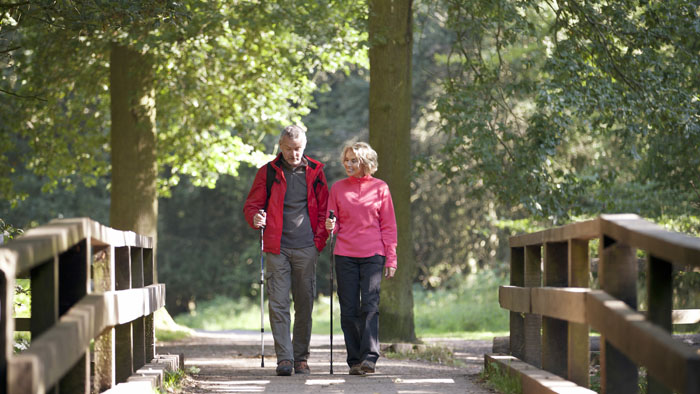
As we get older our body composition changes. This is often a result of becoming less active, which leads to a decrease in our basal metabolic rate (BMR). With less muscle to burn calories, we may find that we can’t eat as much as we used to without gaining weight. Other changes in hormones, tastes, energy levels, and nutrient absorption can also impact our fitness levels and health. However, staying fit over 50 doesn’t mean that you can’t still enjoy eating. Learn how to get the balance right with these great tips.
Stay Active
Many people think that our metabolism decreases as we get older, but this isn’t true. What actually happens is that our activity levels decrease and we lose muscle mass as a result. With less muscle the body needs less energy, so food is stored as fat rather than burned off. Our basal metabolic rate (BMR) then slows down as the composition of our bodies change. The simplest way to counteract a slowing BMR is to stay active. Walking is a good, fairly low-impact exercise that will help to burn calories and maintain muscle mass. Walking is also great for the heart and helps to boost your mood. Other low-impact exercises to try include gardening, swimming, yoga, and Pilates.
Cut Calories, Not Taste
With small changes to the meals you love you can save a lot of calories and still enjoy eating. Many people find that reducing their intake of carbohydrates helps them to stay in shape. Why not try spaghetti squash as an alternative to pasta? And even if you’re not much of a baker, this low carb bread recipe is delicious and simple to make. Alternatively, you can make small changes to the products you consume every day, such as opting for low fat dairy over full fat versions. Many taste exactly the same but pack in a lot fewer calories. Another great tip is to try to make more meat-free meals. Try a bean Bolognese or make a stew with veggies and lentils. You’ll cut calories and saturated fat drastically by skipping meat a couple of nights a week.
Consider Supplements
Another key part of staying fit is maintaining good health. Our bodies become less efficient at absorbing some nutrients as we get older, so it’s important to make the calories we consume as nutrient-dense as possible to stay healthy. Without key vitamins, it can be hard for your body to process food correctly into energy, meaning that you may feel tired and sluggish. You may also put yourself at risk of infections and more serious illnesses. Some of the nutrients you may be lacking include Folic Acid, Vitamin B12, Calcium, Vitamin D, Fibre, and Omega-3 Fats. It’s always preferable to get nutrients through your diet but you may need to consider taking supplements. Consult your doctor to discuss your diet and whether supplements could help you stay fit over 50.
Drink Water
Our sense of thirst also reduces as we get older, so it might not be so easy to tell when we’re dehydrated. Drinking water can help reduce hunger, boosts energy and facilitates digestion. And not drinking enough water can cause urinary tract infections and lead to memory problems, so getting enough water is beneficial for our physical and mental health. Keep small bottles of water in your fridge and drink from them regularly, even if you don’t feel particularly thirsty. You should aim for around eight cups per day for good health.
Sleep Well
Staying fit at any age is all about balance. As well as your diet and activity level, getting enough sleep is an important part of that. As well as giving you the chance to rest your mind and body, sleep helps to regulate the hormones that control hunger signals. Not sleeping well can disrupt these signals and fool your brain into thinking you’re hungry when you’re not. As we get older it can be harder to enjoy a good night’s sleep, possibly because of hormonal factors, physical discomfort or changes to our oxygen intake. If you’re finding it hard to sleep at night then these simple solutions to help you sleep better should help.
Staying fit over 50 doesn’t mean that you can’t enjoy eating the same foods or that you have to make any drastic changes. With small sustainable changes to your lifestyle and diet, you can maintain good health and keep fit for many years to come.